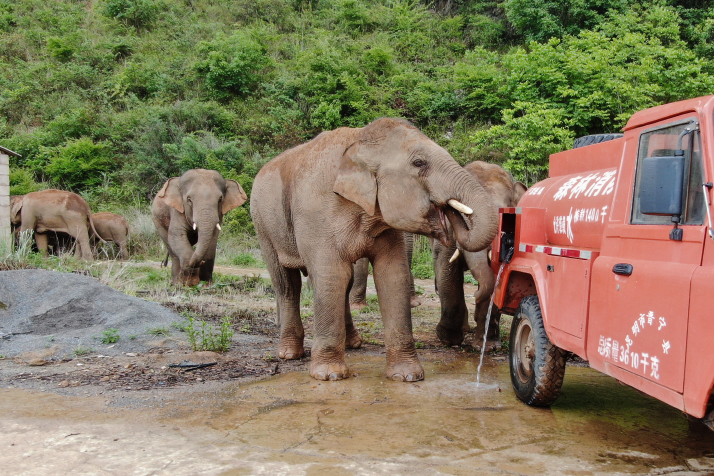| China |
| A herd of 15 elephants have become Internet celebrities during their mysterious trek through southwest China | |
|
|
 Members of a task force examine a drone before dispatching it to track and monitor wandering wild Asian elephants in Eshan County, Yunnan Province, on May 29 (XINHUA)
The past two months have seen some stand-out moments for one herd of 15 Asian elephants. Without any clue as to why, this herd of nine adults, three juveniles and three calves embarked on a mysterious trek in April, leaving their regular habitat bordering Myanmar in Yunnan Province. After traveling over 500 km northward, they reached the vicinity of Yunnan's capital, Kunming. It's rare for these giant animals to undertake such a journey. The towns along the elephants' route were caught unprepared, with experts and local officials scrambling to protect both elephants and humans using any means possible. Residents in villages potentially in the elephants' path were either moved elsewhere in advance or required to remain on higher floors of buildings. Hundreds of people have been mobilized to ensure the elephants' security and a 24-hour command center has been set up to monitor the giants around the clock. As members of a species under top level protection in China, the elephants were welcomed with green lights at each leg of their journey. They swaggered into villages, broke into houses, turned taps on to drink their fill and were even suspected to have broken into kitchens and got drunk on residents' rice wine. At mealtimes, they plundered farmlands, stuffing themselves with corn, bananas or dragon fruits and leaving a mess behind. On June 2, they finally arrived on the outskirts of Kunming. A mysterious trek In March 2020, the herd, originally with 16 elephants, was observed leaving its usual habitat inside a national nature reserve in Yunnan's Xishuangbanna Dai Autonomous Prefecture and headed for another habitat in the neighboring Pu'er region. It is usual for Yunnan's elephants to move between two habitats, so their movements were barely paid attention to. The herd remained in Pu'er for over a year, while the birth of a new calf in December 2020 brought their number to 17. On April 16, the 17 elephants lumbered north into the area of Yuxi, which neighbors Pu'er but had never been visited by the elephants before, putting the herd in the spotlight. After eight days, two of the elephants returned to Pu'er and the remaining 15 began their long trek further north. The reason for this trek and its final destination are still unclear. Experts have put forward several explanations, including that the increasing population of China's Asian elephants, from 193 in the 1980s to around 300 currently, has led to crowding, or that the elephants simply got lost. This wandering team of giants became a misery for populations in their path, and also triggered the curiosity of many online spectators, both in China and abroad. "Where are the elephants heading?" has been a trending hashtag in China since April 16. As this brigade wanders at ease, humans have put in a lot of effort to monitor their movements. Around 20 unmanned aerial vehicles (UAVs) hover 300 meters above the troop, following every step of their journey. There are also dedicated staff in place specifically to count the elephants every few minutes to ensure they remain within the monitored areas. As the elephants have undertaken their expedition during Yunnan's rainy season, there have been times when the rain is too heavy for the UAVs to fly. During these times, members of the monitoring team take the risk of following the animals as closely as possible with cameras. Local police have been sent to escort the herd; roads have been evacuated to facilitate their passage; tons of food, including bananas, pineapples and corn, has been delivered by a line of trucks as a way to both feed them and distract the herd from entering densely populated areas. Fire engines have also been on hand to ensure they have enough water. Throughout all of this, the herd has never hesitated to make trouble. They've stomped through farmland and squashed village houses with their enormous bulk. They're estimated to have caused over 6.8 million yuan ($1 million) in property damage, with local governments following in their wake, offering compensation to residents. Those responsible for monitoring the elephants are beginning to see signs that their pampering may be spoiling them. Elephants have grown increasingly picky about their diet, giving up the cornstalks they once liked to prefer fresh corn. Jin Zhaoxin, a college student in Beijing, has been following the news about the elephants closely. She told Beijing Review that the first thing she does when she wakes up every morning now to is look for updates on the elephants, and she has learned more about this animal: Elephants are good swimmers; they can live up to 120 years and are very smart with long memories. "Even Aristotle said over 2,000 years ago that the elephant was 'the animal which surpasses all others in wit and mind'," she said.  (Above) The wild Asian elephants drink water from a fire engine in the outskirts of Kunming, Yunnan Province, on June 3 Members of a task force examine a drone before dispatching it to track and monitor wandering wild Asian elephants in Eshan County, Yunnan, on May 29 (XINHUA)
The long road home The efforts of authorities in Yunnan to safely guide the elephants back home began to show signs of success in early June. After arriving in the area near Kunming in early June, the elephants finally turned around and began to move southward. "Asian elephants need to live in warm areas and the further north they travel, the less hospitable the climate will be for them," said Chen Mingyong, a professor of ecology and the environment at Yunnan University. "We need to guide them toward their proper habitat before the temperature begins to go down." The elephants' return journey has not been much different to their journey north, adding more episodes to the elephant family drama. On June 6, a bull elephant under 10 years old suddenly broke away from the herd and made off on its own. Shen Qingzhong, head of the Institute of Ecology of Xishuangbanna National Nature Reserve, guessed the act may have occurred because the young elephant is in the rebellious puberty phase. Right now, the 14 remaining elephants are lingering in the mountainous area surrounding Shijie Township in the city of Yuxi. They have been there for over eight days, with the single juvenile remaining at around 20 km away with no sign of returning soon. "Maybe the 14 are waiting for the single elephant to rejoin," Shen said. "Or maybe there are more diverse foods in the farmland in this area and they want to enjoy it longer." Professor Chen revealed that the command center's intention is to guide the elephants back to Pu'er or Xishuangbanna. "For that to happen, they must pass through the Honghe River," Chen said. "The water level in the river is currently higher due to the rains and the elephants might have to wait in Yuxi for a long time. If that is the case, it might be winter before the elephants finally return to their original habitat." (Print Edition Title: The Hefty Parade) Copyedited by G.P. Wilson Comments to yuanyuan@bjreview.com |
|
||||||||||||||||||||||||||||||
|
